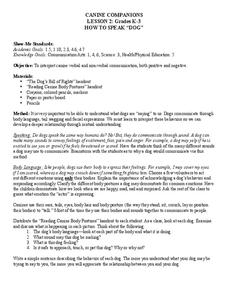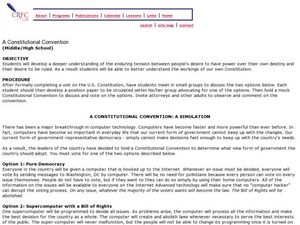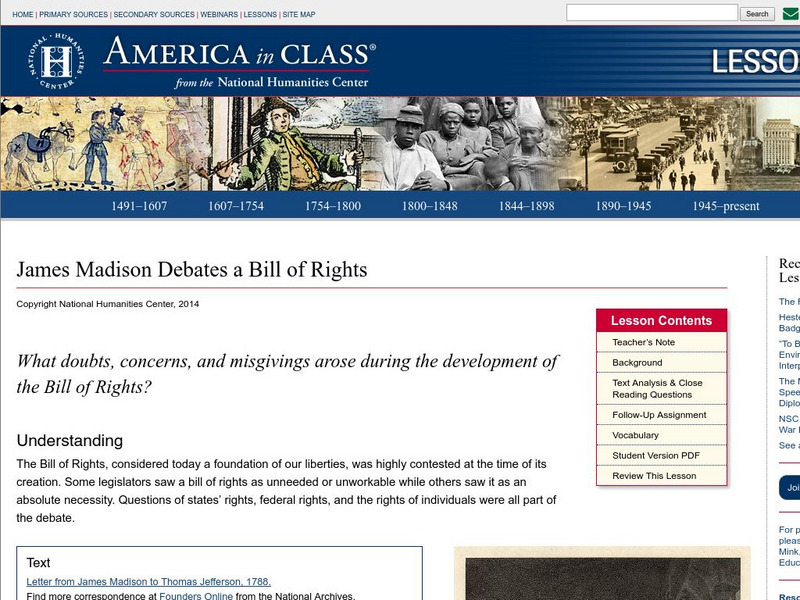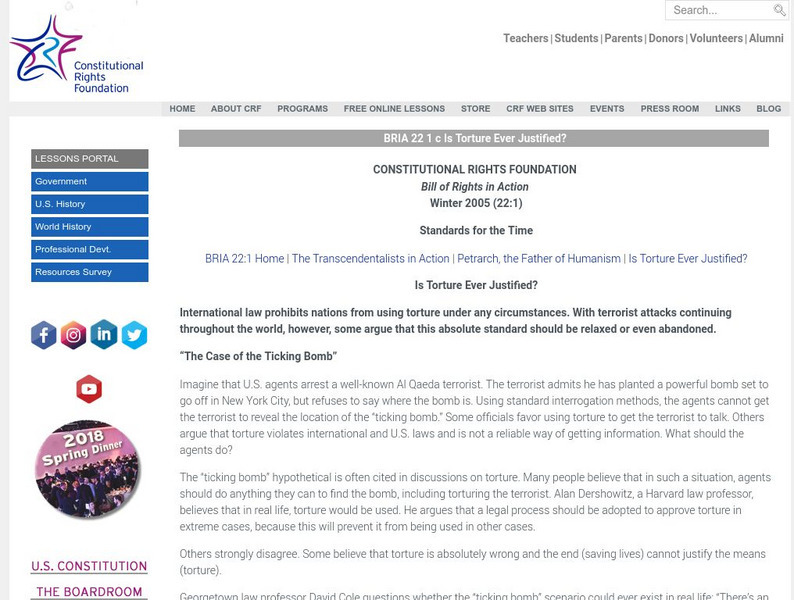Curated OER
Breaking News English: Pregnant Briton Faces Death Penalty
In this English worksheet, students read "Pregnant Briton Faces Death Penalty," and then respond to 1 essay, 47 fill in the blank, 7 short answer, 20 matching, and 8 true or false questions about the selection.
Curated OER
Flip Flop Diplomacy
Ninth graders examine the dress of diplomats. In this American Government lesson, 9th graders read an article and answer guided questions. Students participate in a quiz on the reading.
Curated OER
U.S. Constitution
Learners examine the U.S. Constitution. In this American government lesson, students explore the purpose and significance of the Constitution as they read the provided handouts and complete the provided worksheet.
Curated OER
The Road to Democracy
Eleventh graders examine the road to the American Revolution. For this American Revolution lesson, 11th graders read Thomas Paine's works and identify the issues that the colonists had with the British government.
Curated OER
Citizen Me
Fifth graders examine what it means to be a citizen. Using the Constitution, they discover the functions and purpose of government. They compare and contrast the difference between a democracy and a monarchy. As a class, they discuss...
National First Ladies' Library
Executive Order 9066: Japanese-American Internment
Students analyze conditions under which sections of United States Constitution are superceded, research history of Native Americans, African Americans, and Japanese Americans, and debate policy of reparations for various minority groups...
Curated OER
It Bears Repeating!!!
Students research bears and their characteristics with a specific study on North American bears and polar bears. In this bear study instructional activity, students read books about polar bears and wild bears. Students complete...
Curated OER
The Trivia Magic Square
In this trivia magic square worksheet, students fill in the magic square from given clues. This one-page worksheet contains a five by five square. The answer is provided.
Curated OER
Unit 12: Enlightenment and French Revolution
In this Enlightenment lesson, students respond to 34 short answer questions about John Locke, Thomas Hobbes, Baron de Montesquieu, Jean Jacques Rousseau, Voltaire, Denis Diderot, and Mary Wollstonecraft.
Curated OER
Push/Pull factors in Immigration
Students explore the push/pull factors experienced by immigrant families. They interview a parent and an American about their family's immigration history. Students write a summary of the interview and compare the push/pull factors of...
Curated OER
Canine Companions
Learners interpret canine verbal and non-verbal communication. In this dog communication lesson, students discuss dog communication through bark and body language. Learners study the 'reading canine body postures' worksheet and write...
Curated OER
Pictures Telling Stories
Students see the importance of primary sources in the study of history, but also the limitations of relying only on primary sources of taking the money, as it were, at face value.
Curated OER
Looking After Pets
Students work in groups to compose their own "Duty of Care" for pets and make their own individual list from this discussion and illustrate it with drawing or images taken from magazines, websites or newspapers.
Curated OER
A CONSTITUTIONAL CONVENTION: A SIMULATION
Students discuss two computerized options to change the current U.S. government. In this Constitutional Convention lesson, students write a statement advocating for one of the choices and participate in a mock modern Constitutional...
Curated OER
Striding into the Scientific Future: Illuminating Clinical Trials
Pupils participate in a simulation of a Senate hearing before the committee on Health, Education, Labor, and Pensions. They bring together all the concepts they've explored in science, language arts and government classes over the past...
Curated OER
Lessons from History
Middle schoolers review key vocabulary in history and review a specific website. They write a paragraph summarizing an event they read about on this website. They analyze the importance of studying and learning from history.
PBS
Wnet: Thirteen: Human Rights (Lesson Plan)
A lesson for exploring and reporting on world human rights issues in which learners analyze the Universal Declaration of Human Rights and compare it to the U.S. bill of rights.
National Humanities Center
National Humanities Center: America in Class: James Madison Debates the Bill of Rights
Lesson from the National Humanities Center explores the doubts, concerns, and misgivings surrounding the development of the Bill of Rights. Primary or secondary sources, text analysis and Close reading strategies, background notes, and...
Constitutional Rights Foundation
Constitutional Rights Foundation: Is Torture Ever Justified?
Activity for students promoting a critical analysis and relevant discussion on whether torture is ever justified. Students are presented with the literature on U.S. law and international law on torture as well as Bush administration...
BBC
Bbc News: Week of 12 23 13: Ugandan M Ps Pass Life in Jail Anti Homosexual Law
In Uganda, a bill has recently been passed that will allow gay people to be sentenced to life in jail because of their sexual orientation. Learn why bill has been condemned by President Obama, and is causing many to flee for out of fear...
Constitutional Rights Foundation
Constitutional Rights Foundation: Human Glory Is Enough for Me: Petrarch, the Father of Humanism
In-depth learning activity on Scholasticism and the development of Humanistic thought includes research, writing and class discussion. Comprehensive resource material.
Khan Academy
Khan Academy: Us History: 1754 1800: The Bill of Rights
The first ten amendments to the US Constitution guarantee citizens' essential freedoms and rights.
Khan Academy
Khan Academy: The Gi Bill
The GI Bill is explained. It provided benefits to American veterans of World War II in the form of education, loans, unemployment income, etc.
Khan Academy
Khan Academy: African Americans, Women, and the Gi Bill
Although the GI Bill was intended to provide benefits to all WWII veterans, African Americans and women who had served had difficulties taking advantage of them due to discriminatory practices at the state and local levels.

























